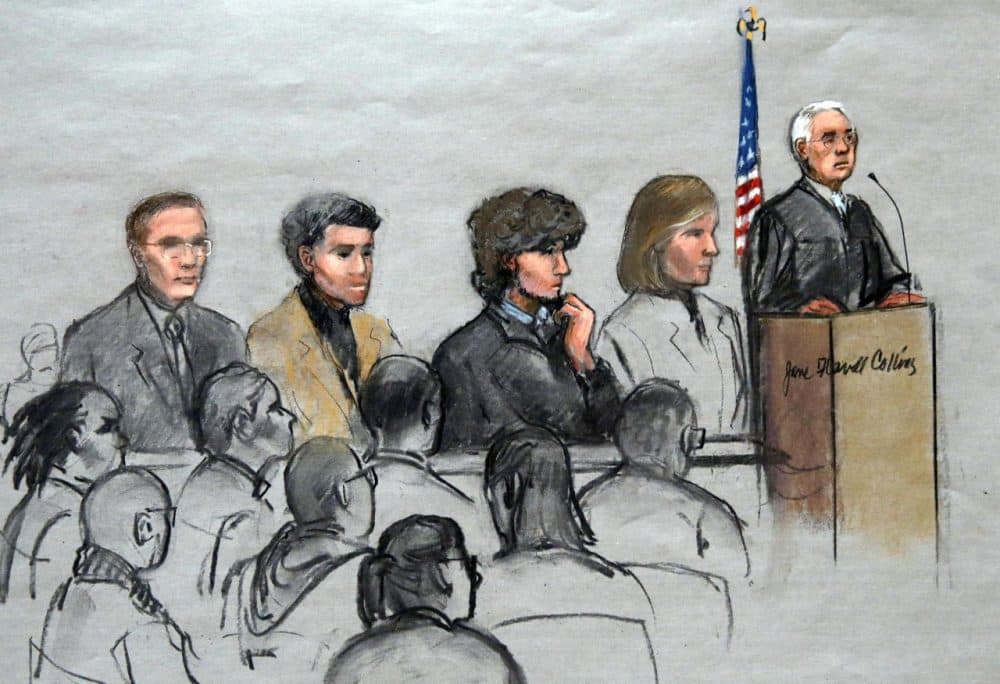Advertisement
The Tsarnaev Trial And The Possibility Of A Plea Deal

When Judy Clarke joined the defense team for Dzhokhar Tsarnaev, it seemed a plea deal could happen in the case. After all, the well-known defense attorney has helped other high-profile clients — such as the Unabomber Ted Kaczynski, Atlanta Olympics bomber Eric Rudolph and Tucson gunman Jared Loughner — avoid the death penalty and get life sentences instead.
But with jury selection now underway in the Boston Marathon bombing trial, there has been no plea deal.
"This case in particular is appropriate for resolution by a plea," said Northampton defense attorney David Hoose. "Where there are so many victims involved and so many people whose lives would be disrupted and old memories brought to the fore again, there is more reason than in any case for there to be a plea [deal]."
Hoose has experience with a notable federal death penalty case in Massachusetts. He represented Kristen Gilbert, a veterans hospital nurse in Northampton convicted of killing four patients in 2001 and sentenced to life in prison. Hoose said the bombing trial will bring about months of reliving "that most horrible experience" and hearing Tsarnaev's life story. He said a plea deal would bring quicker closure and put a focus on the victims.
"There would still be a sentencing hearing; the major difference would be that after a plea the sentencing hearing is really focused entirely on the victims," Hoose said. "At a penalty trial, what happens is that inevitably the bulk of the presentation deals with the defendant and it becomes much more about the defendant’s life rather than the victims' lives."
These sentiments have also been expressed by others.
In a Boston Globe op-ed last month, former federal Judge Nancy Gertner said in most cases the government agrees to accept a guilty plea and the defendant then agrees to take responsibility and accept a life sentence without parole:
If Tsarnaev is convicted of the crimes charged, he will die in prison. The only real issue is where and when. He can go to federal death row, where lawyers will bring appeals and post-conviction motions for years, where only three defendants have ever been executed, and where, as a prisoner slated for execution, he will continue to occupy the attention of the public, the judicial system, and extremists. Or he can be sentenced to spend the rest of his life in isolation, never to be heard from again, in a supermax cell in a maximum security federal prison built especially for those prisoners who are deemed the most dangerous, as has been the case with Unabomber Ted Kaczynski, 9/11 conspirator Zacharias Moussaoui, and Richard Reid, the shoebomber.
So, could there still be a plea deal? Yes, it's possible and a plea can occur at any point during the trial until the jury announces its decision.
However, "as a practical matter, the chances of a plea deal once a trial begins diminishes," said Donald Stern, the former U.S. attorney for Massachusetts. The longer a case goes on, the likelihood of a plea goes down, Stern added.
For a deal to happen, the defense would first have to approach prosecutors and indicate that their client is willing to plead guilty. Then the U.S. Department of Justice would determine whether to accept a guilty plea, a decision that's up to Attorney General Eric Holder, said Stern.
"Unless there's some persuasive indication that the facts and circumstances have changed, the general policy of the Department of Justice is that it's not going to change its mind simply because of the passage of time," Stern said. "There would have to be some showing that the case is weaker or the knowledge about the defendant is different from what was known a year ago when the case was filed for the attorney general, in all likelihood, to change his mind."
Ahead of opening arguments, not much information in this case is public yet, since so many court filings are under seal, but Stern said he assumes the defendant is interested in a plea deal, but the government has not accepted one at this point.
Holder authorized prosecutors to seek the death penalty in January 2014, saying "the nature of the conduct at issue and the resultant harm compel this decision."
As of now, it does not appear that the government is looking to reverse that decision.
"Nothing has changed since the Attorney General first authorized federal prosecutors to seek the death penalty in this case, and the government will continue to move forward with the trial," U.S. Attorney Carmen Ortiz said in a statement.
U.S. District Court Judge George O'Toole said he expects the trial to start on Jan. 26 and last three to four months. If there's a conviction, then the sentencing phase would begin. Tsarnaev faces 30 federal charges, 17 of which carry the possibility of the death penalty.
